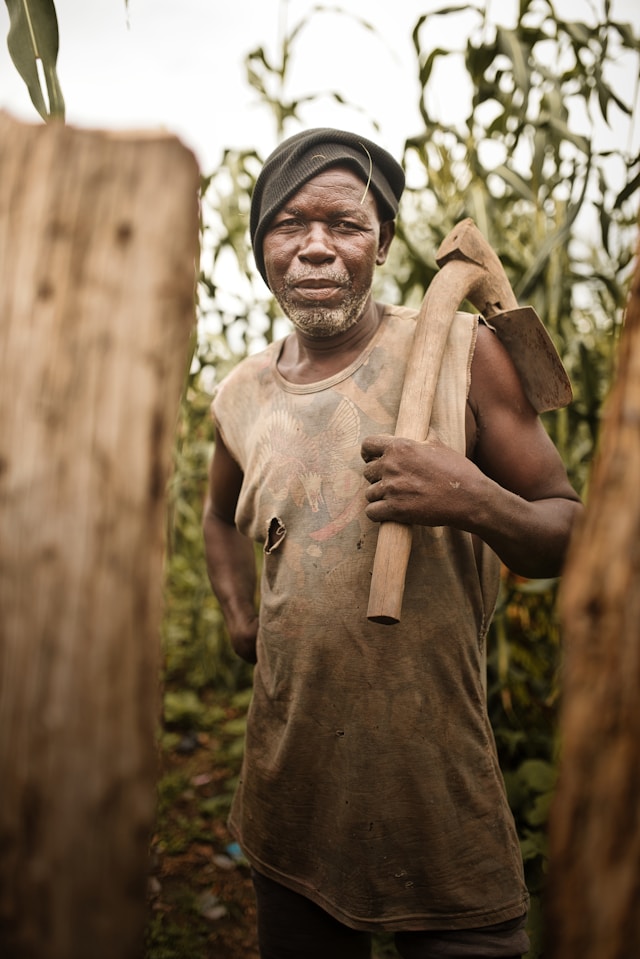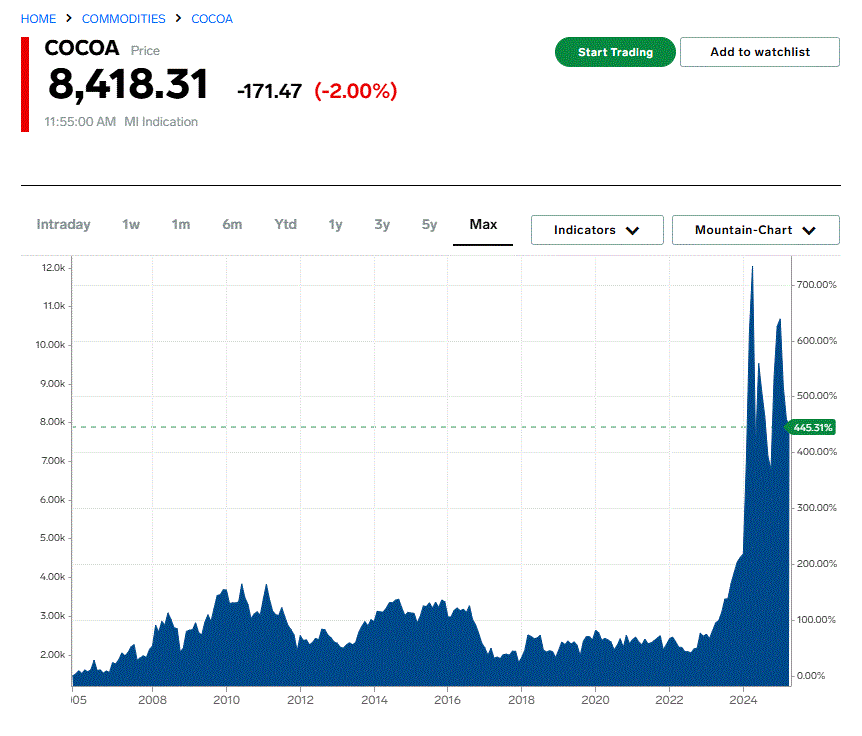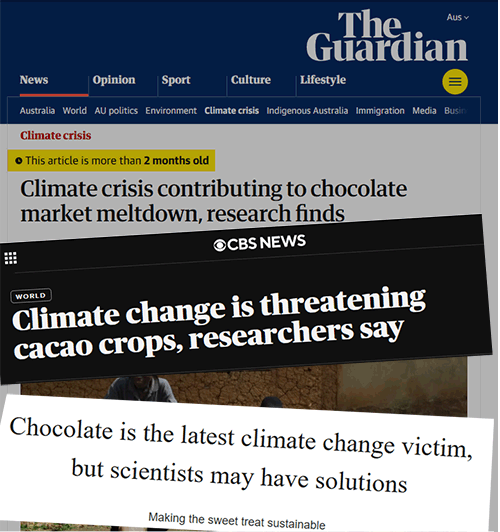Price fixing kills the cocoa farm
There has been a wicked price spike in cocoa beans which the usual suspects are blaming on “climate change” as if your air conditioner was ruining cocoa crops in West Africa. Instead African governments have fixed the price of cocoa for decades, forcing poor farmers to work for a pittance, and keeping the big profits for themselves. Not surprisingly, even though there is a wild price spike, farmers in Ghana are leaving the industry, smuggling crops out (because they get a better price). They didn’t plant new trees, they ran out of money for fertilizer, and didn’t try new varieties. Their children don’t want to farm cocoa, and the yields are falling on old sickly plantations.
So, surprise, socialist government controls wrecked the industry and they are now scrambling to put the pieces back together. Things are so desperate, the government of Ghana raised the price of cocoa by 58% last April and then raised the price of cocoa by another 45% last September, to try to reduce the smuggling. (The government was losing too much money). At one point last year it was estimated that a third of the national crop was lost to smugglers. A few months after this, the farmers were hoarding their beans in expectation the government would have to give them another price rise. Just chaos for everyone.
Meanwhile other socialists use these failures to tell us they have to fix the weather and we must give them lots of money to do it.
It’s always the way. Big Government creates a crisis and then beats us over the head with it, to demand more money and power. Greenies pretend to care about the poor, but they are happy to exploit the poor farmers of Ghana as fodder for press releases for their industrial “renewable” schemes, and banker friends.
Feel the pain of these farmers. Some of them have farmed for decades, yet they have nothing to show for it, saying “ It feels like we are working for other people’s benefit.”
Ghana produces the world’s cocoa; why are its farmers still poor?
Ghana has farmed cocoa for over 100 years. The country is the world’s second-largest producer, behind Côte d’Ivoire. The cocoa industry employs over a million people and contributes about $2 billion in foreign exchange annually. In recent times, prices of the commodity have increased exponentially, pushed by extreme climate events and supply chain crisis on fertilizers used by farmers.
Yet farmers like Anane and Holiata say they see little of this wealth. They point to the low prices set by the Ghana Cocoa Board (COCOBOD), established in 1947. The board sets cocoa prices to regulate the industry and protect farmers from exploitation by European merchants, but farmers argue that these prices fail to reflect the crop’s true value on international markets.
The Cocobod traders were forward selling as much as 70% of the crop one year in advance. But when weather, disease, and a lack of fertilizer hit the crop, the bureaucrats couldn’t find the cocoa they’d already sold. They were caught short, forced to buy cocoa on the open market which sent the prices rocketing. (If only climate models worked, eh, they could have seen this coming?)
According to Oxfam, up to 90% of Ghanaian cocoa farmers do not earn a living income. Many of the 800,000 smallholder farmers who cultivate the crop survive on less than $2 a day, struggling to afford basic needs such as food, clothing, housing, and healthcare.
The cocoa industry is rife with human rights issues, like forced child labor, and slavery. When the environmentalists start to care about pain and suffering in the here and now, instead of theoretical storms in a hundred years time, we might think they give a damn about making the world a better place.

Photo by Charles William Adofo on Unsplash
Apparently man-made climate change made it too wet, then too dry. Sure, we believe you…
The weather has been bad in Ghana in the last two years, first it was too wet which rotted the old sickly trees, and then it was too dry, but no climate model on Earth predicted both these extreme seasons correctly (the witchdoctors might as well use chicken entrails), and other countries nearby suffered bad weather too, yet they increased their crop yield. Nigeria’s cocoa exports saw a year-over-year increase of 15% in October 2024, and Cameroon’s cocoa crop is expected to rise 7% this year.
Price fixing, and regulation hurts the people it was supposed to protect
The Government of Ghana formed the price fixing board to try to protect farmers from volatile prices. Instead they trapped them in poverty and fed a bunch of bureaucrats that may destroy the local industry.
Under Ghanaian law, selling cocoa to anyone other than the Ghana Cocoa Board (COCOBOD) through its licensed buying companies (LBCs) is a crime. The market is tightly regulated, with prices set annually by the government through the Producer Price Review Committee (PPRC).
If the government had offered a service but not forced it upon the farmers, the Cocobod bureaucrats would have had to stay competitive, or the farmers would have abandoned it to make their own deals. But there were no brakes or accountability on the government. In the end, the farmers did abandon it, but years too late, because it was against the law to smuggle the cocoa out of the country — so the farmers had to be desperate before they would take the risk.
It takes up to five years to grow new cocoa plants, so chocolate will be expensive until the free market solves itself, which it will, as long as the government gets out of the way.
Together the Ivory Coast and Ghana provide 60% of global cocoa, they have a nice little monopoly. But with these latest price spikes, many other countries are planting cocoa beans and soon there will be a lot more competition. The West African cartel have just wrecked their own competitive advantage.
Quote of the day: Despite the shocking price rise, chocolate consumption is “inelastic”.

